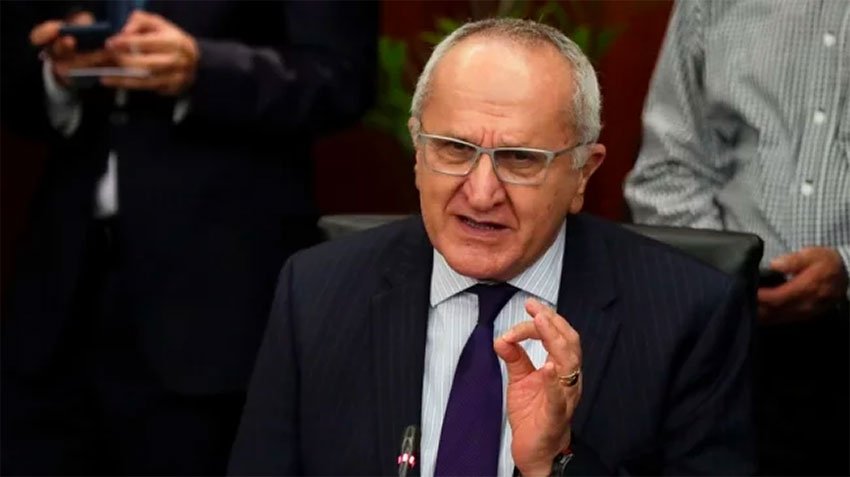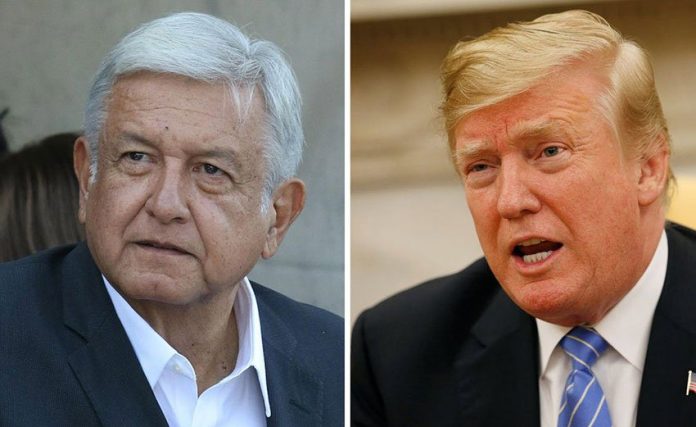United States President Donald Trump announced yesterday that he is placing a 5% tariff on all goods from Mexico to pressure the country to do more to stop immigration into the U.S.
The move provoked a strong response from President López Obrador, who wrote in a letter to his United States counterpart that “social problems are not solved with taxes or coercive measures” and instead proposed dialogue to reach an agreement that is beneficial to both nations.
In a White House statement, Trump said the tariffs will start on June 10 and increase by an additional 5% at the start of each subsequent month to a maximum of 25% if Mexico doesn’t take “action to dramatically reduce or eliminate the number of illegal aliens crossing its territory into the United States.”
“If the illegal migration crisis is alleviated through effective actions taken by Mexico, to be determined in our sole discretion and judgment, the tariffs will be removed,” he explained.
The U.S. president warned that if Mexico should choose not to cooperate, “the sustained imposition of tariffs will produce a massive return of jobs back to American cities and towns.”

However, Trump added that his administration was confident that Mexico “can and will act swiftly to help the United States stop this long-term, dangerous, and deeply unfair problem.”
The U.S. president said that in imposing the tariffs he was invoking authorities granted under the International Emergency Economic Powers Act. Trump declared a national emergency at the southern United States border on February 15.
Tens of thousands of migrants have traveled through the country to the United States border in recent months, raising the ire of the U.S. president who in April threatened to impose tariffs on Mexican auto imports and close the border if Mexico doesn’t stop drug and migration flows within a year.
Experts warned that Trump’s new plan will be damaging to the economy on both sides of the border and that Mexico could introduce its own retaliatory tariffs, as occurred last year when the United States implemented duties on steel and aluminum.
Tariffs are paid by importers, meaning that companies that buy Mexican products will likely pass at least some of their increased costs on to United States consumers.
Mexico sent US $346.5 billion worth of goods to its northern neighbor last year, a figure that underscores the importance of the bilateral trade relationship.
Mexico has taken advantage of the United States for decades. Because of the Dems, our Immigration Laws are BAD. Mexico makes a FORTUNE from the U.S., have for decades, they can easily fix this problem. Time for them to finally do what must be done!
— Donald J. Trump (@realDonaldTrump) May 31, 2019
If the proposed tariffs cause a downturn in the Mexican economy, more citizens would likely try to cross the border to find work in the United States, undermining Trump’s plan.
“Mexico is our friend and neighbor, a partner in trade and security,” Glenn Hamer, chief executive of the Arizona Chamber of Commerce and Industry, told the Washington Post.
“The president’s announcement is baffling and, if carried out, will be terribly damaging.”
José María Ramos García, an international relations professor at the College of the Northern Border in Tijuana, said “it’s very probable that Mexico will respond in a similar way” to Trump’s new universal tariffs, adding “that would generate [additional] tension” in the bilateral relationship.
He questioned the logic of the move given that “we’re trade partners, we share a border and we’re about to enter into a [new] free trade agreement.”
Republican lawmakers warned that the tariffs could sabotage the ratification process for the United States-Mexico-Canada agreement, which appears to be nearing approval after Mexico passed a landmark labor reform package last month and the U.S. agreed on May 17 to lift duties on Mexican and Canadian steel and aluminum.

“If the president goes through with this, I’m afraid progress to get this trade agreement across the finish line will be stifled,” said Senator Joni Erst.
Jesús Seade, Mexico’s foreign affairs undersecretary for North America, told a press conference that the tariffs threatened by Trump would be “disastrous,” adding that Mexico would respond strongly.
“. . . If it happens, we must respond energetically. . . The right thing would be to respond eye for an eye but . . . we have to talk to the United States and we have to see . . . how to respond,” he said.
Seade acknowledged that reciprocal measures would lead to a trade war “and that is the last thing that we want.”
In his missive to Trump, López Obrador was in part conciliatory, writing that he doesn’t want confrontation and doesn’t believe in “a tooth for a tooth” and “an eye for an eye.”
He said that a government delegation headed by Foreign Affairs Secretary Marcelo Ebrard would travel to Washington today to meet with United States officials and “arrive at an agreement that benefits both nations.”
In order not to pay Tariffs, if they start rising, companies will leave Mexico, which has taken 30% of our Auto Industry, and come back home to the USA. Mexico must take back their country from the drug lords and cartels. The Tariff is about stopping drugs as well as illegals!
— Donald J. Trump (@realDonaldTrump) May 31, 2019
But even as López Obrador suggested that there is a diplomatic solution to Trump’s planned protectionism, he condemned the United States government’s immigration policy.
“How did a country of fraternity for all the migrants in the world become, from night to dawn, a ghetto, a closed space where those who seek . . . to live free from misery are stigmatized, mistreated, persecuted, expelled and [their] right to justice is canceled?” López Obrador wrote.
“The Statue of Liberty is not an empty symbol,” he added.
López Obrador also said that Mexico is doing all it can to “avoid” the flow of migrants through Mexico “without violating [their] human rights.”
Indeed, statistics show that deportations by Mexican authorities have increased threefold in recent months compared to the same period last year. Notwithstanding, large numbers of mainly Central American migrants continue to evade authorities en route to the United States border and more than 1,000 crossed into the El Paso area on Wednesday to surrender to U.S. authorities.
United States officials say that corrupt Mexican officials are allowing buses transporting migrants to the border to pass through highway checkpoints.
To stop the flow of migrants, López Obrador reminded Trump that since the beginning of his government he has proposed cooperation on a development plan “to help Central American countries with productive investments in order to create jobs and resolve this difficult matter.”
Mexico last week proposed that the United States fund seven projects aimed at generating economic opportunities and well-being in Central America and stemming the northward flow of migrants.
López Obrador also said that Mexicans will soon have no need to go to the United States “because we’re combating corruption, Mexico’s main problem, like never before!”
Later in the letter, the president said: “Specifically, citizen president, I propose to you to deepen dialogue, to seek real alternatives to the immigration problem, and please remember that I do not lack courage, I’m not a coward or a wimp but rather I act on principles.”
The president’s letter has not made any discernible difference to Trump’s attitude towards Mexico.
In a series of tweets this morning, the U.S. president wrote that “Mexico has taken advantage of the United States for decades,” “the tariff is about stopping drugs as well as illegals!” and “it’s time” to act.
Source: El Financiero (sp), The Washington Post (en), El Sol de México (sp), El Universal (sp)
